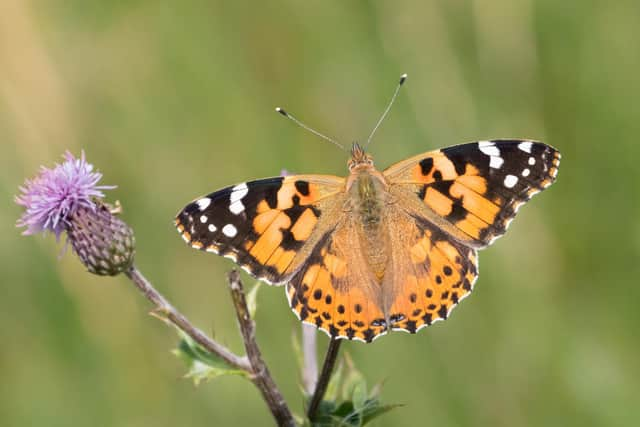Big Butterfly Count 2021: when does UK-wide survey start, how do I take part - and where to get app and chart
and live on Freeview channel 276
Members of the public are being urged to take part in the annual Big Butterfly Count to count the creatures after they battled a tough spring.
Wildlife broadcaster Chris Packham said taking part in the scheme, which is run by charity Butterfly Conservation, could help to provide important research into how climate change is affecting the insects.
Advertisement
Hide AdAdvertisement
Hide AdConservationists said an unseasonably cold and wet April and May had hit butterflies hard.


So, what is the Big Butterfly Count, how can you take part and why is it so important?
Here’s everything you need to know.
What is the Big Butterfly Count?
The world’s biggest butterfly survey aims to find out how the insects are doing in the UK.
Launched more than a decade ago, the nationwide citizen science survey helps conservationists to assess the health of the environment simply by counting butterflies.
Advertisement
Hide AdAdvertisement
Hide AdThe data is processed by experts over three weeks and assists them in understanding where conservation efforts should be concentrated.
It also gives a clearer picture of what butterflies are living where in the UK, as well as providing details about their habits.
When is the Big Butterfly Count 2021?
This year’s Big Butterfly Count runs nationwide from Friday 16 July to Sunday 8 August.
How can I take part?
It’s very simple to take part in the Big Butterfly Count.
All you need to do is spend 15 minutes in an outdoor space of your choosing counting the number and type of butterflies you see.
Advertisement
Hide AdAdvertisement
Hide AdBy downloading the identification chart, you are tasked with spotting and recording 18 species of common butterflies and two day-flying moths over the next few weeks.
You then submit your findings online on the Big Butterfly Count’s website or via the free Big Butterfly Count app.
Last year, more than 145,000 counts were submitted to the Big Butterfly Count, which was a record number.
However, 2020 saw the lowest average number of butterflies logged since the scheme started 12 years ago.
Advertisement
Hide AdAdvertisement
Hide AdThe charity is keen to see if that trend continues this time around.
Why is the count important?
Butterfly Conservation has called on the public to help to measure the impact of the turbulent spring weather on the creatures.
The charity said its records show many species had a poor spring or a delay in emerging following the fluctuating weather.
There have been especially low numbers of speckled wood butterflies, while small tortoiseshells, commas, green-veined whites, large whites and red admirals are also down on their 10-year average, said the charity.
Advertisement
Hide AdAdvertisement
Hide AdApril was the sunniest on record but it was also cold throughout the month. Meanwhile, May was the wettest for 50 years.
Packham, who is vice-president of Butterfly Conservation, said, “Biodiversity and climate crisis is an urgent issue and it can be overwhelming to think about what we can do as individuals to really make a difference.
“Because butterflies and moths make excellent indicators of the impacts of climate change and other human environmental factors, collecting data on their numbers is really important.
“So, something as simple as recording a butterfly spotted in your garden, at your local park or on your window box can play a part in vital research into a global problem. It’s a really valuable contribution everyone can make.”
Advertisement
Hide AdAdvertisement
Hide AdSir David Attenborough, who is president of the charity, has previously spoken about how butterflies are suffering a series of poor years and there is a visible decline in their numbers.
The UK has seen declines in more than three quarters of its butterflies in only 40 years.
Comment Guidelines
National World encourages reader discussion on our stories. User feedback, insights and back-and-forth exchanges add a rich layer of context to reporting. Please review our Community Guidelines before commenting.
